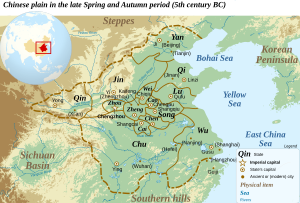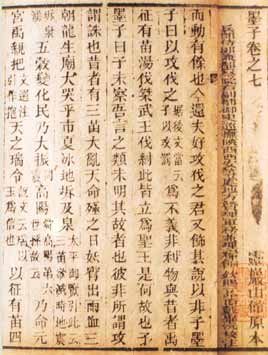Mozi facts for kids
Quick facts for kids
Mozi
墨翟 |
|
|---|---|
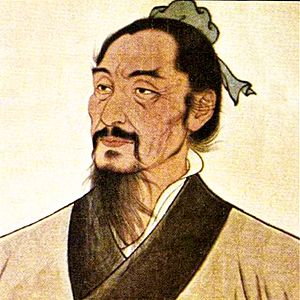
Mozi
|
|
| Born | c. 470 BCE State of Lu, Zhou Kingdom (present-day Tengzhou, Shandong Province)
|
| Died | c. 391 BCE (aged 79) |
| Era | Ancient philosophy |
| Region | Chinese philosophy |
| School | Mohism |
|
Main interests
|
Moral philosophy/ethics, social and political philosophy, logic, epistemology |
|
Notable ideas
|
Mohism |
|
Influenced
|
|
| Mozi | |||||||||||||||||||||||||||||||||||||
|---|---|---|---|---|---|---|---|---|---|---|---|---|---|---|---|---|---|---|---|---|---|---|---|---|---|---|---|---|---|---|---|---|---|---|---|---|---|
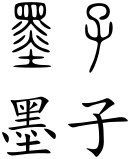
"Mozi" in seal script (top) and regular (bottom) Chinese characters
|
|||||||||||||||||||||||||||||||||||||
| Chinese | 墨子 | ||||||||||||||||||||||||||||||||||||
| Literal meaning | Master Mo | ||||||||||||||||||||||||||||||||||||
|
|||||||||||||||||||||||||||||||||||||
| Mo Di | |||||||||||||||||||||||||||||||||||||
| Chinese | 墨翟 | ||||||||||||||||||||||||||||||||||||
| Literal meaning | (personal name) | ||||||||||||||||||||||||||||||||||||
|
|||||||||||||||||||||||||||||||||||||
Mozi (/ˈmoʊˈtsiː/; Chinese: 墨子; pinyin: Mòzǐ; Wade–Giles: Mo Tzu /ˈmoʊˈtsuː/), also known as Micius (/ˈmɪsiəs/), was an important Chinese philosopher. He lived around 470 to 391 BCE, during a time called the Warring States period. His original name was Mo Di (墨翟). Mozi started a school of thought called Mohism.
Mozi taught that everyone is equal in the eyes of Heaven. He believed that leaders should be chosen based on their skills and worth, not their family background. He looked to ancient wise kings and Heaven to support his ideas.
Born in what is now Tengzhou, Shandong Province, Mozi's ideas were very different from Confucianism and Taoism. He believed in universal love, social order, and sharing. He also thought it was important to honor people who were truly worthy.
Mohism was popular for a while. But it lost favor when the Legalist Qin dynasty took power in 221 BCE. Many Mohist writings were likely destroyed during this time. Later, Confucianism became the main way of thinking. Mohism almost completely disappeared by the Han dynasty.
Mozi's idea of "universal love" (兼愛, jiān'ài) was very important. He thought people should care for everyone equally. This was different from Confucians, who believed it was natural to care more for family. Mozi said love should be unconditional. It should be given to everyone, not just friends or family.
Contents
Mozi's Life and Teachings
Most historians believe Mozi came from a working-class family. He was a skilled carpenter and good at inventing things. Even though he wasn't a high-ranking official, many rulers sought his advice. They wanted his help with building strong defenses for their cities.
Mozi studied Confucianism when he was young. But he disagreed with some of its ideas. He felt Confucianism focused too much on fate and fancy ceremonies. He thought these things wasted money and time for ordinary people.
Mozi gained many followers, especially technicians and craftspeople. They formed a disciplined group that studied his ideas. People admired Mozi for caring deeply about others. He was said to work tirelessly for the good of society. Even Mencius, a famous Confucian, praised Mozi's dedication.
Mozi traveled to different states to stop wars. He once walked for ten days to the State of Chu. He wanted to prevent them from attacking the State of Song. At the Chu court, Mozi showed the chief military strategist, Gongshu Ban, that his war plans would fail. He also told the king that Song's soldiers were ready with his defense methods. Because of Mozi, the Chu king called off the war.
Mozi taught that defending a city wasn't just about walls and weapons. It was also important to trust and keep talented people close by.
Mozi's Philosophy
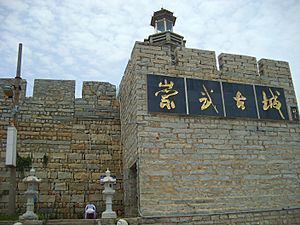
Mozi's teachings focused on looking within yourself and being true to yourself. He believed people learned best from challenges. By thinking about their successes and failures, they gained real self-knowledge. Mozi encouraged a simple life, without too much luxury.
He admired the ancient Xia dynasty and its ways. But he also said that what was "ancient" was new once. So, old ways shouldn't stop new ideas and progress today. Mozi believed people could change their lives through hard work. They could observe the world and judge things by their causes and effects.
Mozi wanted to replace the strong family ties in China with "impartial caring" or "universal love" (兼愛, jiān ài). He argued that people should care for everyone equally. Some philosophers thought this meant not caring for your own family. But Mozi explained that caring for others' parents was a way to be filial to your own. He believed that if you treated others well, they would treat you well too.
Mozi also believed in ghosts and spirits. He thought they helped keep society moral. He said that even if they didn't exist, gathering for offerings helped strengthen community bonds. For Mozi, Heaven (天, tiān) wanted people to love each other. He saw Heaven as a kind and moral force that rewarded good and punished evil. He believed Heaven ruled all living things.
Mozi disagreed with the idea of "Destiny" (非命). He thought that believing everything was fated made people lazy. Instead, he argued that hard work and good actions could change a person's life.
Core Ethical Ideas
Mozi's ethics are a type of consequentialism. This means that actions are judged by their results. Mozi believed actions should benefit all members of society. Because of this, he spoke out against wars, expensive funerals, and even music and dance. He saw these things as not serving a useful purpose for everyone.
The main goals of Mohist ethics were:
- Social order: Keeping society peaceful and organized.
- Material wealth: Making sure people had basic needs like shelter and clothing.
- Population growth: Increasing the number of people, which was important in his time.
Mozi believed that if people had enough, they would be good and kind. He thought the good of the state was more important than individual happiness.
Mozi's philosophy has 10 main ideas:
- Promoting the Worthy: Leaders should hire skilled people, not just friends or family. This helps society work better.
- Identifying Upward: People should look to their good leaders as role models. This helps everyone act well.
- Universal Love: People should care for everyone, not just their own group. This helps solve problems like conflict.
- Condemning Aggression: Mozi was against wars of conquest. He saw them as large-scale robbery and murder that hurt everyone.
- Moderation in Use: People should be practical and avoid waste.
- Moderation in Burials: Funerals should be simple, not overly expensive. Lavish funerals could ruin families.
- Heaven's Intent: Heaven is the ultimate moral guide. It rewards good and punishes evil.
- Understanding Ghosts: Ghosts and spirits help enforce Heaven's will.
- Condemning Music: Mozi opposed grand musical ceremonies. They were very costly and took resources from common people. He didn't dislike music itself, just the wasteful state-sponsored events.
- Condemning Fatalism: Mozi rejected the idea of fate. He believed it made people lazy and irresponsible. People should work hard and take responsibility.
Writings and Influence
The book Mozi is a collection of writings by Mozi and his followers. It was put together over hundreds of years. During the Han dynasty, as Confucianism became the main philosophy, Mohism slowly lost its followers. Many parts of the Mozi book were lost over time. Only 58 of the original 71 chapters still exist.
The Mozi book gives us a lot of information about early Chinese history and culture. It shows Mozi as a spokesperson for Mohist ideas. Unlike other philosophers' writings, it doesn't show much of Mozi's personal feelings or mistakes.
Mohism was very important during the Warring States period. Its ideas about choosing leaders based on skill and universal love were later adopted by mainstream Confucian thought. Its opposition to war became less important after China was unified. Some of its religious ideas were also replaced. So, Mohism's best ideas became part of other philosophies, while its more extreme ones faded away.
In modern times, Mozi's ideas have been looked at again. Some see him as a "philosopher of the people" because of his practical approach. Others compare Mohism to Christianity due to the idea of "universal love." Mozi and his followers were reformers. They wanted to help ordinary people and challenge the wasteful ways of the rich.
Mohism and Science
Mozi's writings also show early scientific thinking. He wrote about how motion stops because of an opposing force. He also had ideas about optics and mechanics. These ideas were very original for his time.
Mozi was the first person to describe the basic idea behind the camera, also known as the camera obscura.
Modern Use of Mozi's Name
In 2016, scientists launched a special satellite for quantum communication. They named it "Micius" or "Mozi" to honor the philosopher's work on optics.
See also
 In Spanish: Mozi para niños
In Spanish: Mozi para niños
- A Battle of Wits – a historical film based around Mohism
- History of geometry
- List of people on stamps of the People's Republic of China
- Fa, an influential concept elaborated by Mozi
Images for kids
-
Confucian philosopher Mencius was one of several critics of Mozi, in part because Mozi's philosophy was believed to lack filial piety.
 | Kyle Baker |
 | Joseph Yoakum |
 | Laura Wheeler Waring |
 | Henry Ossawa Tanner |


